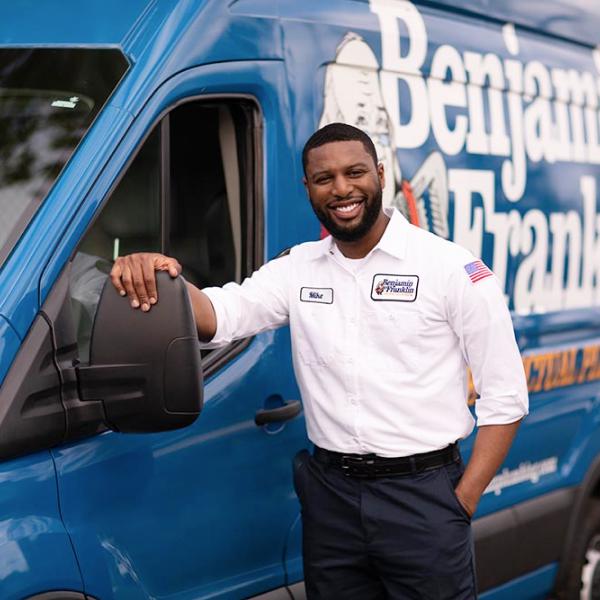Named Forbes' Top Ranked Plumbing Company of 2024!

Our Services
Drain Cleaning

Your home’s drains are essential to the overall performance of your plumbing system. Even the smallest clog can cause your plumbing to smell, create a health and safety concern for your family, move slower than usual, and reduce reliability. If the drain is ignored for long enough, significant plumbing problems can occur, often resulting in major repairs.
While clogged drains are a common part of home ownership, they can be avoided with the right care. Benjamin Franklin Plumbing is here to help keep your drains clean through regular inspection and maintenance.
Searching for emergency draining cleaning near me? Call (214) 910-4888!
We’re prepared to clean all types of drains found in and around your home. Due to our decades of hands-on experience, we’ve seen it all.
Whether your slow drain is caused by grease, fat, food debris, or a rogue fork, our plumbers will take the time to clear away the clog and leave your sink drain looking like new.
While it can be caused by toothpaste, loose hair, or soap scum, a clogged bathroom sink is no match for our plumbers. Our drain cleaning plumbers are ready to clear the clog and remove any leftover residue.
Several things can cause a toilet to clog, and while a plunger may help with some minor toilet clogs, a team of professionals should deal with major toilet clogs. This reduces the chance of overflowing your toilet or facing sewage backup in the home.
While some DIY drain cleaning methods may provide temporary relief from a shower or bathtub clog, it’s essential to have a professional plumber clear away deep-down clogs and any buildup of human hair, pet hair, or soap scum.
If your washing machine drain gets backed up due to a buildup of lint or detergent residue, acting quickly can limit the chaos the clogged drain causes.
Don’t use utility sinks as trash cans. Not everything can, or should, go down the drain!
Floor drains can be incredibly useful in avoiding severe water damage during flooding after a storm or a plumbing emergency. This is why having your floor drains routinely inspected and cleaned is important.
Your home’s main drain is your home’s sewer line. It can run from around 12 to 24 inches long, making it difficult to locate any size clog. Wherever your home’s main drain is located, our plumbers can perform the proper cleaning and clog removal services needed to prevent your home from experiencing sewage buildup.
Any type of clog in your roof drains can result in water overflowing. This can lead to roof leaks and other water damage around your home.
Landscape and yard drains are useful in preventing flooding after rainfall but can become clogged due to leaves, mulch, dirt, soil, and other debris. Ensure your drains are ready to handle whatever weather you get with the team at Benjamin Franklin Plumbing!
To avoid unsanitary sewage backup or flooding in the home, it’s important to check that your basement drains are free of debris and to test your sump pump regularly.
At Benjamin Franklin Plumbing, we have the tools and knowledge to handle your home, apartment, business, industrial facility, or other commercial building drains and plumbing systems. Our drain clean out services provide immediate relief and prevention against clogs developing in the future. We only rely on proven methods and the best equipment to resolve your drain and sewer line plumbing issues.
While clogs can range in severity, it’s essential to have a professional plumber called out at the first sign of one. The sooner you recognize the signs of a clogged drain, the sooner our team can provide the services needed to avoid costly repairs and hazardous situations.
If your toilet is gurgling or bubbling before, after, or during a flush, you probably have a clog in your system. The bubbles you see are coming from a blockage somewhere in your system. While a plunger may clear the clog, a professional plumber will deliver a practical solution.
Any type of water or sewage backup in the home should be addressed by a professional as soon as possible. Not only does this mean that you have an obstruction somewhere in your plumbing, but it can also create a hazardous environment for yourself and your family. Backup can occur in any drain of the home, from the shower to the kitchen sink.
Water should move relatively quickly down your home’s drains, so if things are taking longer than usual, this is a telltale sign that a clog is present in your system and shouldn’t be ignored.
Whether it’s a buildup of soap scum, hair, leftover toothpaste, or food debris, decomposition will cause the clog to smell. After some time, the foul odor will spread and come out of your system’s other drains.
While unexplained puddles of water aren’t always a sign of a clogged drain, it’s important to have them addressed by a professional plumber as soon as possible. This reduces your water waste, saves you money on your monthly water bill, reduces the chance that your home or yard experiences water damage, and allows our team to locate and clear away any obstructions in your system.
It’s important to understand the causes of clogged drains, not only to understand what your plumbing system may currently be experiencing but to stop any clogs early in their formation.
Some of the most common types of debris buildup we clear from our customer’s drains include soap, hair, cooking oil or grease, food scraps, and other natural debris, including twigs and leaves.
When damage occurs to your pipes, whether they’re cracked, ruptured, broken, or corroded from old age, backups and clogs are a normal effect. This damage must be repaired by a professional plumber right away.
If your home’s storm drains aren’t clear, or your sump pump isn’t as reliable as you thought it was, the heavy rainfall can also bring in natural, and not-so-natural debris into your system, causing significant blockages. Additionally, storms, heavy rainfall, and the flooding that follows can cause your home’s soil to shift, causing damage to your system. The increased pressure on your system can cause things to rupture, letting in pounds of soil, rock, and dirt.
You should always consider the placement of your plumbing when planting new shrubbery or trees. Regardless of your pipes' age, any roots looking for water will latch onto your pipe and grow into it over time. When the root expands, it will lead to slow-moving drains and an inefficient system.
There are things you should and should not flush down your toilet. To give your system the best chance to remain reliable and efficient, it’s important to understand what these are. Some of the items you should always avoid flushing down your toilet include:
Not only do frozen pipes cause obstructions in the regular flow of things as the ice melts, but your system can also become overflooded with water. This can result in major pipe damage, backup, or more clogs throughout your system.
Sometimes your vent can become clogged, trapping hazardous sewer gases in your home, and adding pressure to your system. Our team can safely clear away any clogs your plumbing system has.
Clogged drains are a common home plumbing issue. And while it may seem like store-bought liquid drain cleaner will help, it can actually cause more damage than good.
When you use drain cleaning chemicals, the harsh cleaning solution enters pipes and begins to heat up, working its way through the clog and the lining of your pipe. This provides your drain some temporary relief, but the clog will return if all the debris isn’t cleared away. Drain cleaner is also incredibly harmful to the environment, so you’ll be far better off with a professional plumber clearing your drains. Hiring a professional plumber ensures the correct cleaning methods are used so your lines aren’t damaged.
At Benjamin Franklin Plumbing, we’re dedicated to providing your drain with all the care and services it needs to stay free of clogs. Our plumbers are trained, licensed, and certified to complete virtually any drain service your home could need, including:
Don’t delay drain cleaning services. Count on our team of professional drain cleaners, equipped with the best tools in the industry, to provide fast response times, prompt service, and emergency availability. Call (214) 910-4888 to get started.
For 20 years, Benjamin Franklin Plumbing has been delivering expert, reliable, and punctual plumbing services to homeowners throughout North America. Don’t take our word for it! Check out some comments from our happy customers.
Yes! Drain cleaning is necessary for every clog if you want the clog to go away completely. Not cleaning the drain after removing the clog gives your water room to flow again but leaves nasty gunk and leftover debris behind. Drain cleaning ensures that your drain is completely clear of all debris.
It is recommended to schedule a drain cleaning at least once every few years. This may change depending on the frequency of use your system sees, the volume it handles, and age. Additionally, if your property sees heavy rainfall, you’ll want your outdoor and basement drains cleaned more often.
A variety of factors can affect the costs of your service, including:
Regardless of the type of clog or gunk in your drain, you can rely on our team for a thorough inspection of your system and upfront and honest pricing before any service is started.
Some ways to prevent drain clogs after our drain cleaning services include:
The majority—if not all—professional plumbers advise against using any drain-cleaning chemical solutions. The chemical reaction that occurs in your toilet, drain, or plumbing heats up very hot, inflicting damage on the lining of your plumbing.
Additionally, drain cleaners don’t always work. If you have standing water and the drain cleaner doesn’t work, you’ll then have a fixture full of hazardous chemicals. This makes it more difficult to clear away the obstruction.
Related Content
Check with your local franchise, services may vary by location.
With each of our Benjamin Franklin Plumbing locations being locally owned and operated, we live and work in the communities that we serve. We’re proud to give back to our neighbors in the best way we can – providing trustworthy plumbing services that make life easier.
We develop great relationships with our customers because:
Benjamin Franklin Plumbing® of Kaufman and Ennis
3219 Peachtree Rd, #158License 16091
 Your Privacy Choices
© 2025 Benjamin Franklin Franchising SPE LLC. All Rights Reserved.
Your Privacy Choices
© 2025 Benjamin Franklin Franchising SPE LLC. All Rights Reserved. 